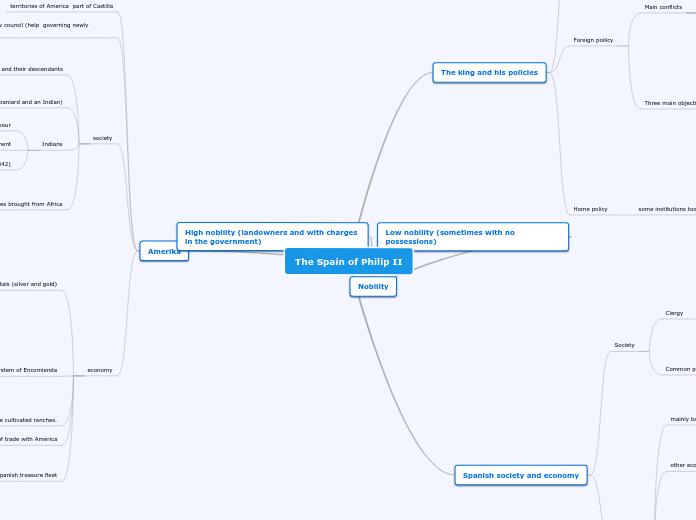The Spain of Philip II
The king and his policies
Inherit territories
Spain, the Low Countries, much of Italy, territories in Central Europe, Castilian territories in America and possessions in North Africa and Far East.
Felipe was the son of a Portuguese princess. He claimed the throne when the King of Portugal died. This added Portuguese possessions in Africa, Asia and Brazil to his vast empire.
This added Portuguese possessions in Africa, Asia and Brazil to his vast empire.
Foreign poilicy
Main conflicts
Rivaly with France
The Turks
The defence of Catholicism
Conflicts in North West Europe
Low Countries: Calvinism spread throughout the Low Countries
English support for the rebels led to a conflict with England under Elizabeth I, who became queen in 1558
Three main objectives in the foreign policy
Conservation of each territories
Strengthening of spanish rule in Europe
Defence of the Catholic Faith
Home policy
some institutions took part in the administration of the empire
Different territories of the Empire maintained their own laws and institutions, guaranteed by institutions like the Chief of Justice in Aragon
The Councils gave advice to the king in some areas or about specific territories; the State Council took decisions for the whole Empire
A Viceroy governed some territories in name of the king
courts of justice
Audiencias
Chancillerias
Spanish society and economy
Society
Clergy
High church officials(influence in the court)
Cardinals
Bishops
Common people
paid taxes and carried out productive work
Some merchants became wealthy through trade with America
Peasants, artisans, craftsmen and servants
Economy
mainly based in agriculture
other economic activities
craftsmanship
Basque iron
Steel
Trades extremely important
Spain: trade with America
castilian economy became weaker
high taxation
inflation
arrival of precious metal from America
a lot of money in circulation
affected by the cost of imperial policy
wealth of Castilla used to paid the wars
In Italy
In Flanders
monarchs ask for loans
sometimes they couldn’t pay back (bankrupts)
prices rose greatly (price revolution)
Amerika
territories of America part of Castilla
Carlos V created a new council (help governing newly adquired territories)
society
Spaniards and their descendants
owned the land
held government positions (creoles)
Mestizos (children of a Spaniard and an Indian)
intermediate social position
Indians
manual labour
suffered harsh treatment
New laws regulated the way that they were treated(1542)
Black slaves brought from Africa
very hard conditions
worked in regions where the Native population had declined as a result of war and epidemics
economy
precious metals (silver and gold)
famous mines
Potosí in Bolivia
Zacatecas in Mexico
operated with native work force (mita)
Affixed percentage of the value of the metals to the state
system of Encomienda
Spanish colonist was granted labour and tribute payments from a ground of Indians
encomendero protect the native workers and instruct them in Christianity.
became a kind of slavery for the indians
Haciendas were large cultivated ranches.
Spanish crown had a monopoly of trade with America
controlled by the “casa de contratacion” (Sevilla)
spanish treasure fleet
naval convoy that transported twice a year goods from America to Spain
Other countries tried to attack to steal the precious metals.
specially England
